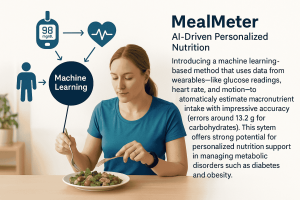MealMeter is an AI-powered system developed to revolutionize how nutritional intake is tracked and managed. By leveraging machine learning and data collected from wearable devices, the system estimates macronutrient intake (carbohydrates, proteins, fats) with high accuracy. This innovation is especially significant for individuals managing metabolic disorders like diabetes and obesity.

Technology Behind MealMeter
-
Wearables as Data Sources: The system integrates continuous glucose monitoring (CGM), heart rate trackers, and motion sensors to capture a real-time picture of the body’s physiological responses.
-
Machine Learning Algorithms: Using large datasets of dietary intake and metabolic responses, the AI predicts macronutrient consumption with minimal error. In trials, carbohydrate estimation errors were around 13.2 grams—a significant improvement over traditional self-reported food diaries.
-
Automation: Unlike manual logging apps, MealMeter requires no active input from users, reducing bias and increasing adherence.
Clinical Applications
-
Diabetes Management
-
Helps patients monitor carbohydrate intake more precisely, supporting better glycemic control.
-
Potentially reduces the risk of hypoglycemia and hyperglycemia.
-
-
Obesity & Weight Management
-
Offers accurate calorie and nutrient intake estimates, assisting dietitians and clinicians in designing personalized weight-loss interventions.
-
-
Hospital & Clinical Nutrition
-
Could be deployed in hospitals to track patient recovery diets, ensuring balanced nutrition without overwhelming medical staff.
-
Benefits
-
Eliminates reliance on self-reported food logs, which are often inaccurate.
-
Provides real-time feedback, empowering patients to adjust food choices immediately.
-
Supports personalized medicine, tailoring dietary advice to each individual’s metabolic response.
-
Reduces clinical workload, giving nutritionists AI-backed insights for better patient outcomes.
Challenges & Future Outlook
-
Integration with Healthcare Systems: Must align with electronic health records (EHRs) for broader clinical adoption.
-
Data Privacy: Wearable health data raises security concerns. Robust safeguards are needed.
-
Accessibility: High costs of wearables may limit availability in lower-income populations.
Despite these challenges, MealMeter represents a paradigm shift in clinical nutrition, moving from generalized dietary guidelines to precision nutrition guided by AI. Future developments may include integration with genomic data, offering even more customized diet plans.